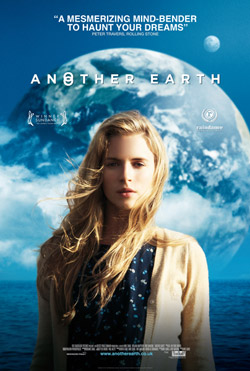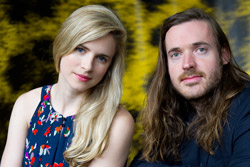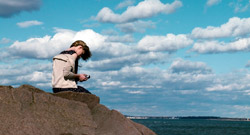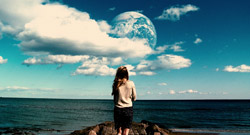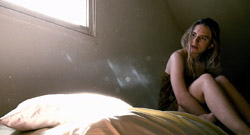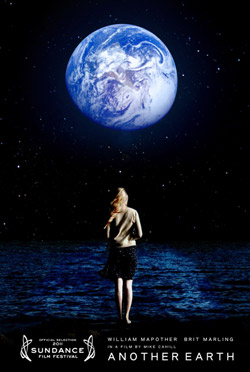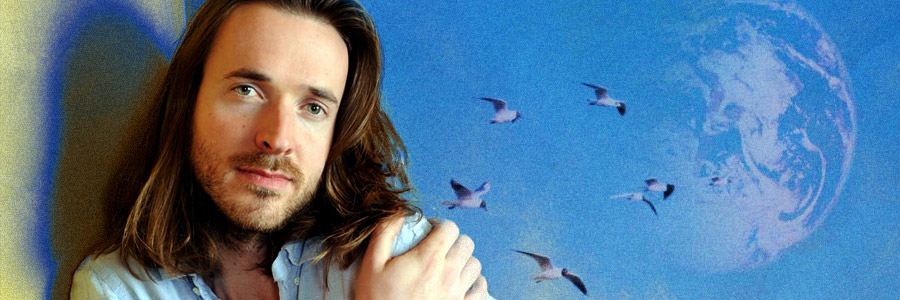
Mike Cahill

ANOTHER EARTH (CINEMA)
20th Century Fox International
Release date: December 2nd, 2011
Certificate (UK): 12A
Running time: 92 minutes
Director: Mike Cahill
Writers: Mike Cahill, Brit Marling
Music: Fall On Your Sword
Cast: Brit Marling, Matthew-Lee Erlbach, William Mapother
The first thing that came to my mind after seeing Another Earth was that I really needed to talk to the film’s writer, director, producer and editor Mike Cahill. It’s so rare for a film to not only affect you on an emotional level but on an intellectual level as well.
Cahill’s first feature, which he wrote and directed, was the 2004 documentary, Boxers and Ballerinas. It was a film that looked at the lives of four very different people – two in Florida and two in Havana — with an eye on the US-Cuba conflict. A year later Leonard Cohen: I’m Your Man was released. It told the story of the Canadian artist’s life, it was directed by Lian Lunson who also produced it with Mel Gibson, and Cahill edited it.
This was followed by Everyone Stares: The Police Inside Out, a documentary by Stewart Copeland, the drummer from The Police — it told of the band’s rise to fame and their eventual break-up in 1982. His latest feature is of course Another Earth, a film so striking in both its content and style that I just couldn’t get it out of my head, nor would I want to. It left me wanting to ask Cahill so many questions and I’m thankful he had some time to answer them when I got in touch.
What first sparked your interest in the possibility of there being something like another Earth?
In the movie we have these two characters, John and Rhoda, who exist in this kind of isolation after what takes place at the start of the film. Did you experience a similar kind of isolation while writing the story?
One of the central questions the film poses is “what would it be like to meet yourself?” Yet the question is much bigger than it seems. Do you think, given the global problems we’re facing today, that it’s now more pressing than ever that we ask “is the human race ready to encounter itself?”
With NASA announcing the discovery of Kepler-22b earlier this week, does it feel like it’s also about time we finally start to seriously consider life beyond our planet?
Another Earth is also about second chances. Do you think society rarely gives people like Rhoda, a former-convict, the second chances they so badly need?
How did the multiverse concept change your outlook on space?
After reading books by physicists like Greene and Hawking, I’m sure it wasn’t just your ideas about space that changed, but also time, was this the case?
The “broken mirror theory” spoken by Dr. Richard Berendzen, which posits that as soon as the two parallel earths become aware of each other, their synchronicity is broken and from there they each follow different paths, was this an idea you were familiar with before working on the story?
You’ve cited Krzysztof Kie?lowski as being one of your favourite directors and The Double Life of Veronique being a personal favourite of yours, what was it about this particular film that captured your imagination?
Around the same time I saw Another Earth, I also saw Chris Marker’s La Jetée which you’ve also mentioned before. This remarkably rich and yet minimalist short film must have left quite an impression on you, what did it feel like when you first saw it?
What’s next for Earth 1’s Mike Cahill in terms of filmmaking?
Finally, what reason would you give for wanting to visit Earth 2?
I have no doubt that whichever Earth I might exist in; a couple, few or an infinite amount, I’m out there keeping an eye on whatever Cahill writes, directs, produces or edits next, just as in this one.

Patrick Samuel
The founder of Static Mass Emporium and one of its Editors in Chief is an emerging artist with a philosophy degree, working primarily with pastels and graphite pencils, but he also enjoys experimenting with water colours, acrylics, glass and oil paints.
Being on the autistic spectrum with Asperger’s Syndrome, he is stimulated by bold, contrasting colours, intricate details, multiple textures, and varying shades of light and dark. Patrick's work extends to sound and video, and when not drawing or painting, he can be found working on projects he shares online with his followers.
Patrick returned to drawing and painting after a prolonged break in December 2016 as part of his daily art therapy, and is now making the transition to being a full-time artist. As a spokesperson for autism awareness, he also gives talks and presentations on the benefits of creative therapy.
Static Mass is where he lives his passion for film and writing about it. A fan of film classics, documentaries and science fiction, Patrick prefers films with an impeccable way of storytelling that reflect on the human condition.
© 2022 STATIC MASS EMPORIUM . All Rights Reserved. Powered by METATEMPUS | creative.timeless.personal. | DISCLAIMER, TERMS & CONDITIONS
HOME | ABOUT | CONTACT | TWITTER | GOOGLE+ | FACEBOOK | TUMBLR | YOUTUBE | RSS FEED
CINEMA REVIEWS | BLU-RAY & DVD | THE EMPORIUM | DOCUMENTARIES | WORLD CINEMA | CULT MOVIES | INDIAN CINEMA | EARLY CINEMA
MOVIE CLASSICS | DECONSTRUCTING CINEMA | SOUNDTRACKS | INTERVIEWS | THE DIRECTOR’S CHAIR | JAPANESE CINEMA

